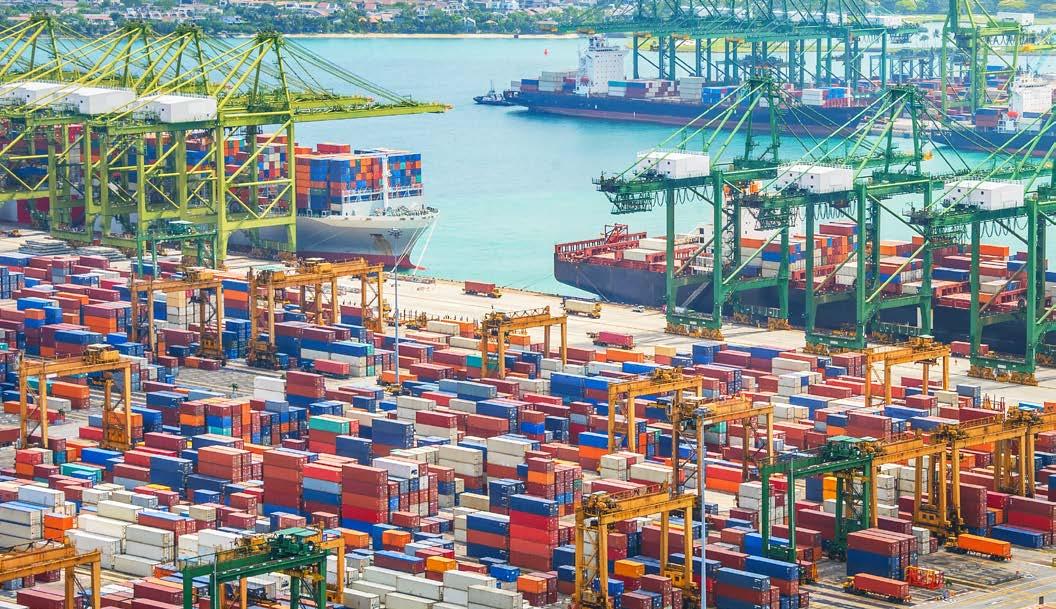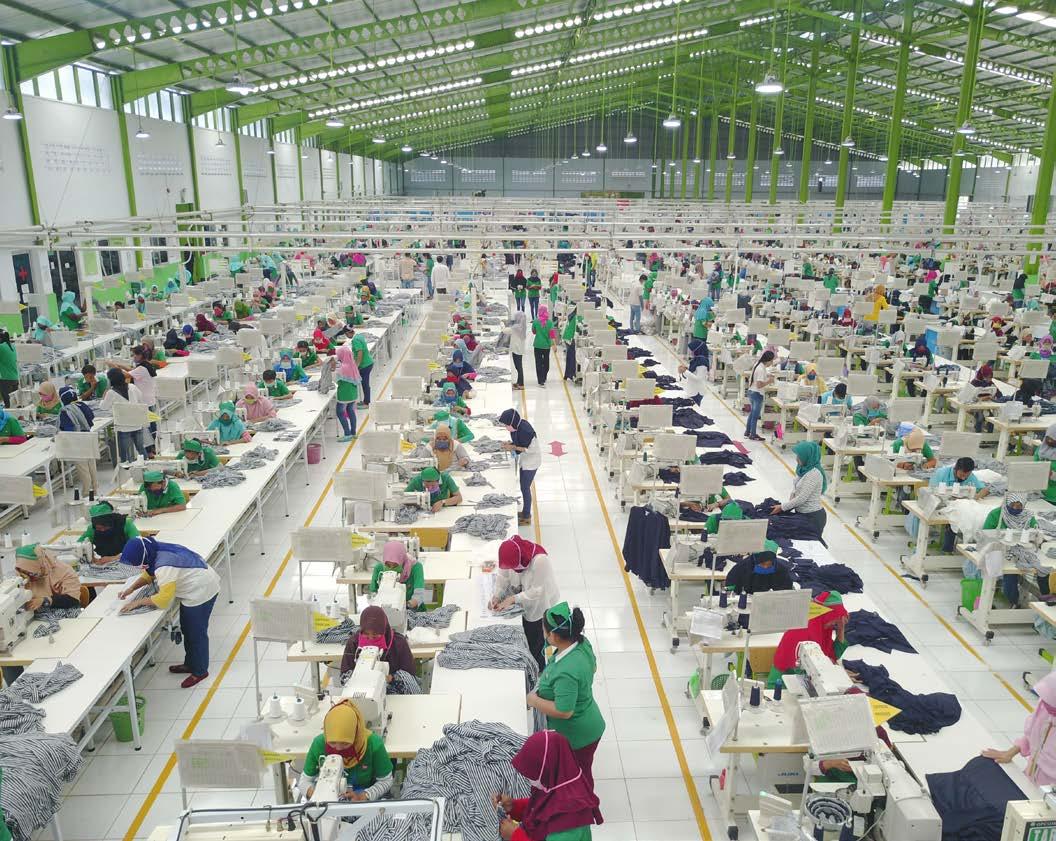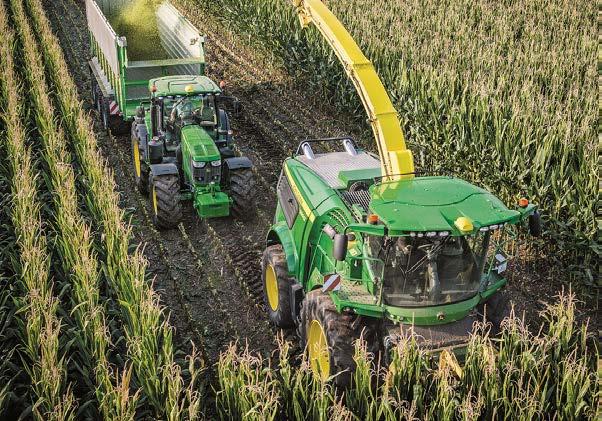
11 minute read
FEATURE The end of globalisation: How it will reshape food, fuel and supply chains
RESHAPING FOOD, FUEL AND FACTORY SUPPLY CHAINS
In recent decades globalisation has transformed economies, societies, and capital markets. More and more companies started operating on an international scale, enabling them to look beyond their homeland for manufacturing, supplies and labour.
This period was accompanied by a marked decline in inflation and lower central bank interest rates. By participating in the global economy millions of people were able to join the ranks of the middle class.
However, the current wave of globalisation could be coming to an end. This is because an increasingly confrontational relationship between America and China has been exacerbated by the Ukraine conflict. The Coronavirus epidemic has also exposed fractures in our economic interdependency.
WHY DOES THIS MATTER?
An end to the positive effects of globalisation has significant implications for investors.
First, nations will need to become less reliant on outsourcing for manufactured goods. Robotics providers should benefit as manufacturing is moved closer to end markets and more automation is introduced.
Second, the surge in prices for grain and fertiliser, following the imposition of Russian sanctions and the supply disruptions associated with the Ukraine conflict, has highlighted the strategic importance of domestic agricultural production.
Companies that can enhance agricultural productivity and the nutritional content and appeal of food products are ideally positioned to gain from the current dislocations in the soft commodities markets.
By Mark Gardner Senior Reporter
Finally, overdependence by Western European economies on Russian energy will create incentives to develop domestic energy resources both in fossil fuels and in renewables.
From a stock perspective Kerry (KYGA), Ocado (OCDO), Deere & Company (DE:NYSE) and John Wood (WG) all offer goods and services that could benefit from these trends.
GOLDEN AREA OF GLOBALISATION
The current wave of globalisation began in the 1990s and was triggered by the collapse of the Soviet Union, the subsequent expansion of the European Union and economic reforms in China, India and Latin America.
Tariffs in the industrialised world more than halved. India joined the World Trade Organisation in 1995 and China followed in 2021. Resources that were previously inaccessible to Western economies including the labour forces in these countries and markets were tapped.
The introduction and widespread adoption of international container shipping, falling costs for rail transportation, coupled with advances in communication through the internet fuelled this wave of globalisation.
Between 1930 and 2000 there was a huge decline in the cost of air and sea transportation. This was mirrored by a marked reduction in the charges associated with both telephone and satellite communication.
DRIVERS OF DEGLOBALISATION
The integration of China into the world economy and Eastern Europe into the European Union were key drivers for the exponential growth in goods traded because China and Eastern Europe were the most popular outsourcing destinations.


IS THE DEGLOBALISATION ARGUMENT WRONG?
Speculation that the Russia-Ukraine war will accelerate a process of deglobalisation and/or lead to the fracture of the world trade and financial systems looks overdone, argues Oxford Economics.
‘There will certainly be some reshuffling of supply chains and trade patterns, especially involving Russia,’ it says.
‘The conflict may also give some further momentum to broader changes in supply chains already in train due to the pandemic and other recent disruptions and trade restrictions, though we doubt the effect of that will be very big.’
Oxford Economics adds: ‘Firms may give some more thought to doing business in parts of the world subject to geopolitical risks – including possibly China – and in some cases this may tip the balance against such an engagement.
‘Some of these supply chain shifts may be painful for some firms in the near term and may intensify claims that deglobalisation is happening. But the medium-term impact is likely to be small, with some shifts (such as importing more from one place than another) not necessarily implying deglobalisation at all.’
However, as both regions mature, they are witnessing a slowdown in their respective growth rates.
Another factor driving deglobalisation has been the imposition of higher tariff rates by America and China. Global steel and aluminium tariffs imposed by the US in 2018 were a shock to the global trade system and prompted retaliation.
The US-China trade war has taken the average US tariff on Chinese imports from 3% at the outset to almost 20% now.
A report published in 2020 by the Economist Intelligence Unit predicted that the pandemic would reverse globalisation by accelerating a move towards regional supply chains.
‘By building a quasi-independent regional supply chain in America or Europe, a global company will provide a hedge against future shocks to their network,’ the report said.
Covid has disrupted trade and highlighted China’s pre-eminent role in global value chains.
According to its state council, China accounted for 30% of world manufacturing in 2021, up from 22.5% in 2021. Chinese products are ubiquitous in the electronics, automotive, machinery and textile sectors.
BENEFICIARIES OF DEGLOBALISATION
‘We are entering a period of mass customisation particularly with the rise of robotics,’ says David Jane, a portfolio manager at Premier Miton.
‘We are replacing mass produced homogenous goods from China with more unique goods produced with high value labour in the west, but in combination with high levels of technological input.’
Whilst Jane acknowledges domestic manufacturing may be more expensive, he maintains it has many strategic advantages.
‘First, companies are better able to control their intellectual property. Second, they can be much more flexible in the production phase with faster turnarounds. Finally, they become much less reliant on lengthy shipping routes, which have environmental issues going forward.’
Jane also suggests companies able to facilitate an increase in domestic energy production will be in demand.
‘In this deglobalised and perhaps more hostile world what becomes important is to have your own energy production. That goes to both fossil fuels and renewables in practice.
‘Many countries have huge fossil fuel reserves they are not using and there has been a massive underinvestment. Many countries have become very lazy about their energy supply in recent years, assuming it will be cheap and freely available from Russia and the Middle East, and that has been called into question.’
Jane argues that businesses able to enhance agricultural productivity or improve the nutritional quality and taste of food will gather increasing interest among investors.
‘Ukraine and Russia are not only key producers of grain for the rest of the world, they are also important suppliers of fertilisers,’ he says.
‘So, there are huge issues around food supply. Also, a growing and wealthier population will require better and higher quality food in the future.’

FOUR STOCKS RELEVANT TO THE DEGLOBALISATION THEME
Kerry (KYGA) €88.68
Kerry
100
50
2014 2016 2018 2020 2022
Chart: Sharesmagazine.co.uk • Source: Refinitiv If countries are under pressure to improve the amount of food sourced domestically, one way to make a limited range of products more appealing is to use flavourings.
Kerry is a global manufacturer of ingredients and recipe solutions for the food and beverage industry. It supplies branded and private label packaged foods in the UK and Ireland. Kerry is also embedded into customers’ supply chains by covering flavour, textile and nutritional needs.
Ingredients manufacturers often act as the research and development centres for food companies. In recent years they’ve been in demand to help reduce fat, sugar and salt content given government pressure on food companies to offer healthier products, and a general shift among consumers towards health and wellness.
Kerry’s first quarter 2022 results were ahead of expectations with organic growth increasing by 12.9% including 6.8% volume growth in taste and nutrition activities.
The company has been managing inflation well. Group EBITDA (earnings, before interest, tax, depreciation and amortisation) margins increased by 10 basis points in the three-month period.
According to Berenberg, earnings per share are forecast to grow by 12.7% between 2022 and 2023, from 429.2 cents to 483.8 cents. This places Kerry on a 2022 price earnings ratio of 20.7 falling to 18.3 in 2023.
The shares are currently trading at their lowest level since January 2019, despite the business making significant progress in recent years.
John Wood (WG.) 175.7p
John Wood
(p)
500
0
2014 2016 2018 2020 2022
Chart: Sharesmagazine.co.uk • Source: Refinitiv Russia’s invasion of Ukraine is spurring Western countries to think about the source of future energy supplies, and making governments think more about domestic resources.
There is a good chance more money will be ploughed into oil and gas drilling, as well as investment into renewable energy, and this plays to John Wood’s strengths. Its shares have been weak for years amid fears about a reduction in oil and gas activity, yet the outlook is now starting to improve.
John Wood is an energy services company with $6.4 billion of sales operating in more than 60 countries. It is involved in many different activities from consulting and project work to getting its hands dirty with maintenance and engineering.
In June the company agreed the sale of its Built Environment business for $1.9 billion. The proceeds will be used to reduce debt and thereby strengthen the group’s balance sheet.
In April, management highlighted an increase in contracts around ‘maximising production volumes from conventional upstream assets’ specifically in the Middle East. The order book was up 19% yearon-year to $7.7 billion in 2021.
Berenberg forecasts a 2022-2024 compound annual earnings per share growth rate of 11%.
The broker has a 270p price target representing 54% upside from current levels. This is based on a target six times EV/EBITDA (enterprise value/ earnings before interest, tax, depreciation and amortisation) multiple.
Ocado
(p)
2,000
Ocado (OCDO) 849p
0
2014 2016 2018 2020 2022
Chart: Sharesmagazine.co.uk • Source: Refinitiv
Ocado uses robots in its warehouses to pick customer orders, a critical part of its solutions platform which it has licensed to US grocery firm Kroger and others around the world.
The company has just raised £578 million through a share placing, and it also announced a new £300 million revolving credit facility.
This is a critical development because it provides the group with significant liquidity to fund the expansion of its smart technology platform.
Ocado is introducing various innovations such as the world’s lightest and most efficient grocery fulfilment bot; much lighter grids; robotic arms that pick groceries directly from the grid; and increased capability for short lead time deliveries.
Competition and technological innovation in automating grocery fulfilment will enhance the convenience of digital grocery shopping.
Grocers therefore will be forced to address their online propositions and Ocado’s platform is a structural winner.
Online grocery requires both centralised fulfilment and micro-fulfilment, addressing different shopping occasions and markets.
What also makes Ocado interesting from an ‘end of globalisation’ perspective is its move into vertical farming. This is where crops are grown indoors in stacked layers, often next to a grocery distribution centre. It minimises water, land and transport and carbon footprints.
Ocado has a stake in Jones Food Company which is building its second vertical farm. While this investment is unlikely to be a key driver for Ocado’s share price, it is a sound strategic move and could lead to further activity in this field over time.
Deere & Company (DE:NYSE) $317.93

Deere & Company
400
200
0
2014 2016 2018 2020 2022
Chart: Sharesmagazine.co.uk • Source: Refinitiv
The ongoing rally in commodity prices will continue to fuel agricultural equipment demand, encouraging farmers to boost spending on new kit. Deere & Company is a natural beneficiary given it is one of the dominant players in this market globally.
Furthermore, a drive to increase domestic agricultural production in various parts of the world should also lead to increased investment in the type of equipment offered by Deere – either from direct buyers or rental companies wanting to increase their fleet.
Deere is organised into four divisions, the two largest of which are dedicated to agricultural machinery and make up roughly two thirds of sales.
Production and Precision Agriculture develops and manufactures equipment and technology for production-scale farming such as tractors, combines and seeding and crop care equipment.
Small Agriculture and Turf supplies mid-size and small growers and makes production systems for dairy and livestock. Products include small tractors, ride-on mowers, golf course equipment and utility vehicles.
The Construction and Forestry division manufactures earth movers, material handling, timber harvesting and road building equipment and accounts for roughly a quarter of sales.
The fourth division is Financial Services, which provides credit to buyers of Deere equipment and makes up roughly 10% of sales. Image Provided as Courtesy of John Deere
WEBINAR

WATCH RECENT PRESENTATION WEBINARS


Frenkel Topping Group
Richard Fraser, CEO
Frenkel Topping Group is a long-established family of businesses who are tried, tested and trusted. We provide advice and technical support to our legal Clients and those they represent. We support lawyers and their Clients with a concierge approach to anything they may need throughout the litigation journey.
Impax Asset Management Group
Ian Simm, Founder & Chief Executive
Impax Asset Management Group offers a range of listed equity, fixed income and private markets strategies. All strategies utilise the firm’s specialist expertise in understanding investment opportunities arising from the transition to a more sustainable economy.

eEnergy Group
Harvey Sinclair, CEO
eEnergy Group is a digital energy services company. Empowering organisations to achieve net zero by tackling energy waste and transitioning to clean energy without the need for upfront investment.
Visit the Shares website for the latest company presentations, market commentary, fund manager interviews and explore our extensive video archive.
CLICK TO PLAY
EACH
VIDEO SPOTLIGHT







